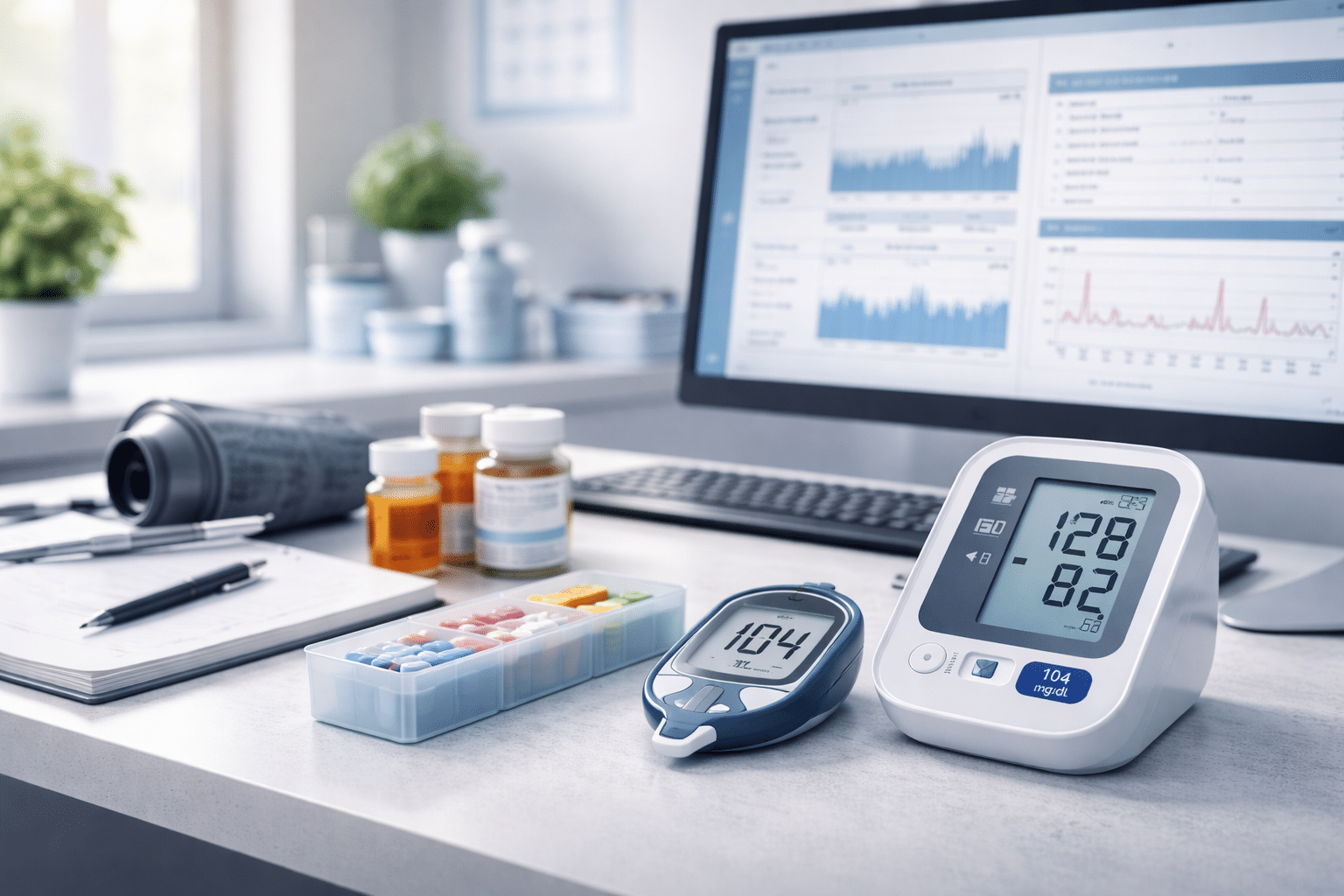Hormone replacement therapy (HRT) is a treatment used to replenish hormones that your body no longer produces in sufficient amounts, especially as you approach menopause. It’s primarily used to relieve symptoms like hot flashes, sleep disturbances, and other hormonal imbalances that can occur during this transitional phase.
Focusing specifically on menopause, HRT plays a crucial role in managing the discomfort associated with decreased hormone levels. This therapy aims to maintain your quality of life as your body navigates these significant hormonal changes.
Understanding Hormones and Menopause
Estrogen and progesterone play pivotal roles in women’s health, influencing everything from the menstrual cycle to mood regulation. These hormones are crucial for reproductive health and also affect other body systems, like bones and skin.
During menopause, the body’s production of these hormones diminishes, leading to the typical symptoms many women experience, such as hot flashes and mood swings. This decrease is because the ovaries gradually cease hormone production, marking the end of reproductive years. The drop in estrogen levels, in particular, can have widespread effects on the body, influencing everything from skin elasticity to bone density.
Hormone replacement therapy is often recommended to manage these changes. HRT supplements the body’s hormones, specifically estrogen and progesterone, to alleviate menopausal symptoms and prevent long-term health issues such as osteoporosis and heart disease. The therapy can be administered in various forms, including pills, patches, or gels, tailored to individual needs and health profiles.
Types of Hormone Replacement Therapy
Broadly, HRT can be divided into systemic and local therapies, each tailored to different needs and symptoms.
Systemic HRT
Systemic HRT is what you might consider the all-encompassing approach. It involves delivering hormones into the bloodstream, affecting the entire body. This type is typically used when symptoms are widespread, affecting more than just the vaginal area.
Systemic treatments come in several forms:
- Oral pills
- Skin patches
- Gels
- Injections
Local HRT
Local HRT targets specific areas of the body, primarily the vaginal symptoms of menopause, like dryness, itching, and discomfort during intercourse. Local treatments include vaginal creams, tablets, or rings. These products provide hormones directly to the vaginal area, reducing systemic absorption and associated risks. This makes them a safer option for those particularly concerned about the broader effects of estrogen.
Each type of HRT has its form of application, and your choice might depend on convenience, how your body handles hormones, or the specific symptoms you’re addressing. For instance:
- Pills are often the go-to for their ease of use.
- Patches can be ideal for steady hormone release throughout the day.
- Gels provide an alternative for those who prefer not to take oral medications.
- Vaginal creams, tablets, or rings are best for those primarily dealing with vaginal discomfort.
Systemic treatments come in several forms:
- Oral pills
- Skin patches
- Gels
- Injections
Benefits of Hormone Replacement Therapy
HRT provides significant relief from menopausal symptoms, which can markedly improve quality of life. Here’s how HRT can help:
- Relief from Menopausal Symptoms: HRT is remarkably effective in reducing severe menopausal symptoms such as hot flashes, night sweats, and vaginal dryness, which often disrupt daily activities and comfort. By managing these symptoms, HRT can help restore a comfortable and more normal lifestyle.
- Prevention of Osteoporosis: Estrogen, a key component of most HRT, helps maintain bone density. This is crucial as the drop in estrogen during menopause can accelerate bone loss, making postmenopausal women more susceptible to fractures. HRT has been shown to prevent osteoporosis and reduce the risk of fractures in menopausal women.
- Improved Mood and Emotional Well-being: Menopause can often lead to mood swings and emotional distress. HRT can stabilize these mood fluctuations and contribute to a better overall emotional state. This is partly due to the role estrogen plays in regulating brain function, which affects mood and emotional health.
Enhanced Sleep Quality: The hormonal changes during menopause can disrupt sleep, leading to insomnia and poor sleep quality. By stabilizing these hormonal levels, HRT can help improve sleep, making it easier to fall asleep and stay asleep.
Each type of HRT has its form of application, and your choice might depend on convenience, how your body handles hormones, or the specific symptoms you’re addressing. For instance:
- Pills are often the go-to for their ease of use.
- Patches can be ideal for steady hormone release throughout the day.
- Gels provide an alternative for those who prefer not to take oral medications.
- Vaginal creams, tablets, or rings are best for those primarily dealing with vaginal discomfort.
Systemic treatments come in several forms:
- Oral pills
- Skin patches
- Gels
- Injections
Risks and Side Effects
While HRT can significantly improve your life during menopause, it’s important to be aware of the potential risks and side effects. Engage in an open dialogue with your healthcare provider to make the most informed decision.
Potential Risks
HRT is associated with an increased risk of certain conditions, particularly if initiated more than 10 years after menopause begins. These risks include:
- Breast cancer: Prolonged use of combined estrogen and progestin therapy has been linked to a slight increase in the risk of breast cancer.
- Heart disease and strokes: There is an increased risk of heart disease and strokes, especially in women who start HRT after age 60 or more than ten years after menopause.
- Blood clots: Estrogen therapy can elevate the risk of blood clots, which can be serious or even life-threatening.
Common Side Effects
Aside from these risks, there are also more common, but usually less severe, side effects associated with HRT:
- Irregular bleeding or spotting is common, especially during the first few months of hormone therapy.
- Breast tenderness or swelling can occur as the body adjusts to hormonal changes.
- Headaches might also be experienced initially but often subside after the body acclimates to the new hormone levels.
Alternatives to Hormone Replacement Therapy
If you’re exploring options beyond hormone replacement therapy (HRT) to manage menopausal symptoms, several non-hormonal treatments and lifestyle adjustments can provide relief:
Medications
Certain antidepressants like SSRIs and SNRIs, often prescribed for depression, have been found effective for hot flashes and night sweats. Medications like gabapentin, originally used for nerve pain, can also help, particularly with sleep disturbances associated with menopause.
Natural Remedies and Lifestyle Adjustments
- Dietary Changes: Incorporating foods rich in phytoestrogens, like soy products, may help alleviate some menopausal symptoms due to their estrogen-like effects. However, their effectiveness can vary.
- Stress Reduction: Techniques such as mindfulness, meditation, and cognitive behavioral therapy can effectively manage stress and reduce menopausal symptoms like hot flashes.
- Sleep Hygiene: Improving sleep environment and habits can greatly reduce menopause-related sleep issues. This includes maintaining a cool bedroom, using breathable bedding, and avoiding stimulants like caffeine close to bedtime.
Embracing Your Wellness Journey
It’s essential to have open conversations with your healthcare provider about your symptoms and explore all available treatment options, including both hormonal and non-hormonal therapies. At Zeam Health & Wellness, we are dedicated to guiding you through this transition. Our team is here to support your journey toward optimal health by providing personalized care plans tailored to your unique needs. Don’t hesitate to reach out and discuss how we can help manage your menopausal symptoms effectively.




